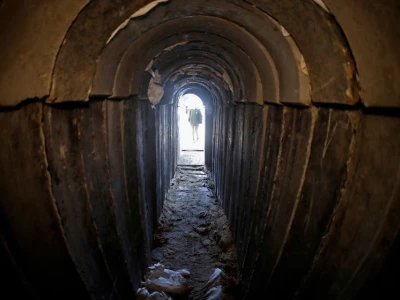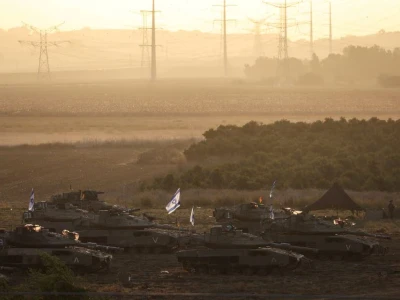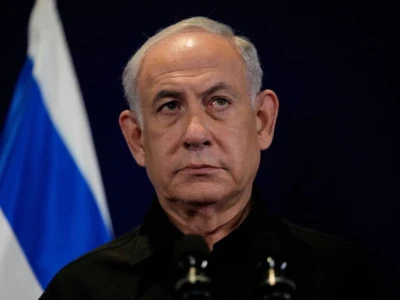
Israel prepares ground assault on Gaza as Palestinians flee
Netanyahu security adviser Tzachi Hanegbi said Israel was "trying not to be drawn into a two-front war" and warned Hezbollah to stay out of the fighting.
GAZA/JERUSALEM, Oct 14 (Reuters) - Israel was preparing on Saturday to launch a ground assault in the Hamas-controlled Gaza Strip, after telling Palestinians living in the densely populated territory to flee south towards a closed border with Egypt.
The Israeli national security adviser meanwhile warned Lebanese militant group Hezbollah not to start a war on a second front, threatening the "destruction of Lebanon" if it did.
Israel has vowed to annihilate Hamas in retaliation for a rampage in which its fighters stormed through Israeli towns a week ago, shooting civilians and seizing scores of hostages in the worst attack on civilians in Israel's history.
Some 1,300 people were killed in a brutal onslaught that shocked Israel, over the killing and horrifying mobile phone footage and reports from medical and emergency services of atrocities in the towns and kibbutzes that were overrun.
In response, Israeli jets and artillery have subjected Gaza to the most intense bombardment it has ever seen, putting the enclave, home to 2.3 million Palestinians, under total siege.
Gaza authorities say more than 2,200 people have been killed, a quarter of them children, and nearly 10,000 wounded. Rescue workers searched desperately for survivors of nighttime air raids.
Thousands of Palestinians fled the north of the Gaza Strip on Saturday from the path of the expected Israeli ground assault, while Israel pounded the area with more air strikes and said it kept two roads open to let people escape.
U.S. President Joe Biden called Israeli Prime Minister Benjamin Netanyahu and, while reiterating "unwavering" support, discussed international coordination to ensure innocent civilians have access to water, food and medical care.
Biden also spoke with Palestinian President Mahmoud Abbas, who stressed the urgent need to allow urgent humanitarian aid corridors in Gaza.
Hamas leader Ismail Haniyeh said Palestinians would "remain in our land" even as one million Gaza residents were reported to have fled their homes since Israel began its bombardment.
The surprise Hamas attack on Oct. 7 launched the region into a new crisis as furious Israeli leaders prepare to respond with crushing force.
"IDF (Israel Defense Forces) soldiers and battalions are deployed across the country and are increasing operational readiness for the next stages of the war, with an emphasis on significant ground operations," the military said in a statement.
It added this would include air, sea and land assaults and cover an "expanded arena of combat," without elaborating.
On Friday, the Israeli military told the population of the northern half of the Gaza Strip, which includes the enclave's biggest settlement Gaza City, to move south immediately. On Saturday, it said it would guarantee the safety of Palestinians fleeing on two main roads until 4:00 p.m. (1300 GMT). As the deadline passed, troops were massing around Gaza.
Hamas has told people not to leave and says roads out are unsafe. It says dozens of people were killed in strikes on cars and trucks carrying refugees on Friday, which Reuters could not independently verify. Israel says Hamas is preventing people from leaving in order to use them as human shields, which Hamas denies.
In one Gaza City neighborhood that Israel ordered evacuated, bombs fired from warplanes hit several houses during the night, residents said.
"We lived a night of horror. Israel punished us for not wanting to leave our home. Is there brutality worse than this?" a father of three said by telephone from a hospital where he had taken shelter, declining to give his name for fear of reprisals.
"I prefer to die and not leave, but I can't see my wife and children die before my eyes."
The Palestinian Red Crescent said it had received an Israeli order to evacuate the hospital by 4:00 p.m., but would not do so because it had a humanitarian duty to keep providing services to the sick and wounded.
'RELEASE OF THE WOMEN AND CHILDREN'
The attacks on Israel have plunged the nation into deep grief and galvanised it for war, with hundreds of thousands of reservists mobilised within days.
Avichai Brodetz, a farmer from Kibbutz Kfar Aza whose wife and three children were taken captive to Gaza, set up a camp outside the Israeli army headquarters to focus attention on the plight of kidnapped Israelis.
"The first thing that needs to happen is the release of the women and children," he told reporters.
Hamas' armed wing said Israeli air strikes had killed nine captives including four foreigners overnight. Hamas had threatened to kill one hostage for every building Israel strikes without warning.
Israel's attacks on Gaza failed to halt Hamas missile strikes deep into Israeli cities.
The only route out of Gaza not under Israeli control was a checkpoint with Egypt at Rafah. Egypt officially says its side is open, but traffic has been halted for days because of Israeli strikes. Egyptian security sources said the Egyptian side is being reinforced and Cairo has no intention of accepting a mass influx of refugees.
A U.S. State Department official said the United States was working to open the crossing to let some people out, and had been in touch with Palestinian-Americans who want to leave Gaza. Washington later said it had told its citizens to try to reach the crossing.
The U.S. said on Saturday that 29 U.S. citizens were in killed in the Hamas attacks, with 15 unaccounted for, up from 27 previously.
Countries and aid agencies have sent supplies to Egypt but have been unable to bring them into Gaza. Israel says nothing can enter through Rafah without its coordination.
Israel says its evacuation order is a humanitarian gesture to protect residents while it roots out Hamas fighters. The United Nations says so many people cannot be safely moved within Gaza without causing a humanitarian disaster.
HEZBOLLAH WARNING
The violence in Gaza has been accompanied by the deadliest clashes at Israel's northern border with Lebanon since 2006, raising fears of war spreading to another front.
Lebanon's armed Hezbollah movement, like Hamas a close ally of Iran, said it had fired at five Israeli outposts in the disputed Shebaa Farms area with guided missiles and mortar bombs.
Reuters saw missiles fired at an Israeli army post and heard shelling from Israel and gunfire.
Israel's Kan radio reported five border villages were under lockdown in response to a suspected incursion from Lebanon.
Netanyahu security adviser Tzachi Hanegbi said Israel was "trying not to be drawn into a two-front war" and warned Hezbollah to stay out of the fighting.
"We hope Hezbollah won't, de facto, bring about the destruction of Lebanon, because if there is a war there the result will be no less," he said, alluding to long-standing Israeli threats to launch heavy strikes on the country in a bid to stem launches of Hezbollah's extensive missile arsenal.
Washington is also determined to ensure Iran and Iran-backed groups such as Lebanon's Hezbollah do not enter the conflict. The White House said Biden reiterated his warning on Saturday against anyone seeking to expand the conflict.
Related
Related

The Hamas tunnel city beneath Gaza: a hidden frontline for Israel

Israeli defense chief says troops will soon see Gaza 'from inside

Whatever unfolds in Gaza war, judgment day looms for Netanyahu

